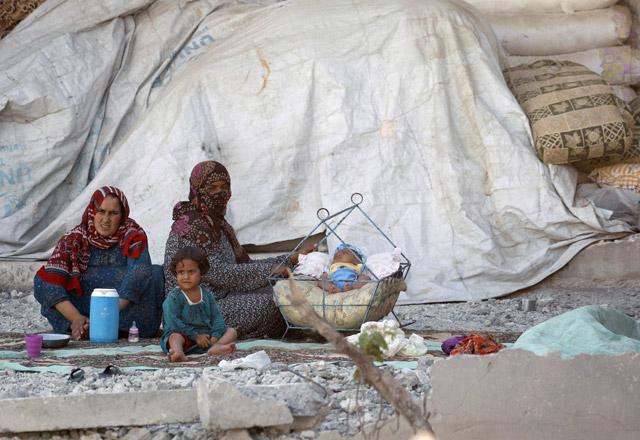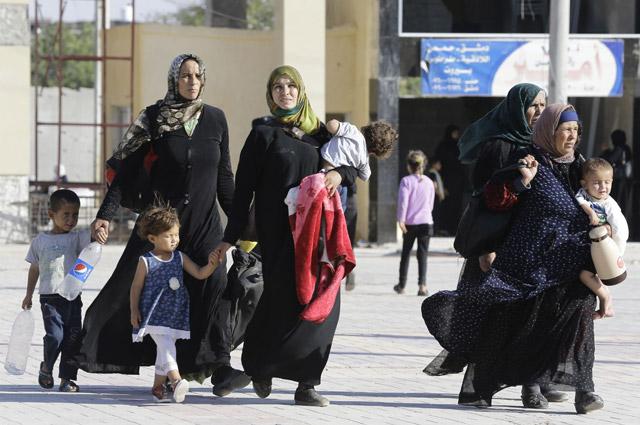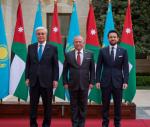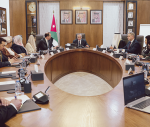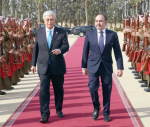You are here
US-backed militias in final push against Daesh in Raqqa
By Reuters - Oct 16,2017 - Last updated at Oct 16,2017
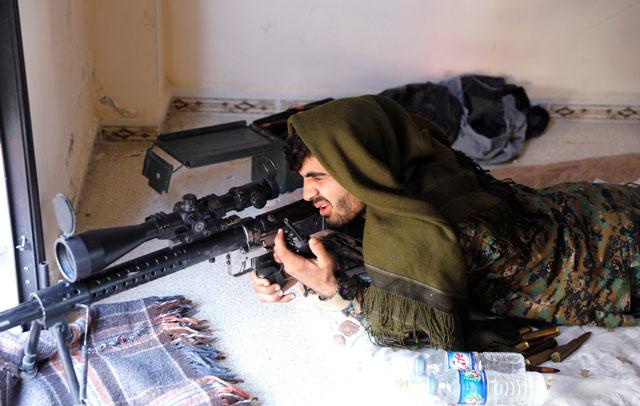
A sniper of Syrian Democratic Forces takes up a position opposite the National Hospital where Daesh militants are holed up at the frontline in Raqqa, Syria, on Monday (Reuters photo)
RAQQA, Syria — US-backed militias battled foreign fighters defending the last pocket of the Daesh extremist group’s one-time Syrian capital of Raqqa on Monday, bringing their four-month campaign for the city to the brink of victory.
A Reuters correspondent saw smoke rising above the city and heard machinegun and mortar fire.
A field commander of the Syrian Democratic Forces (SDF) alliance of Kurdish and Arab militias in Raqqa said he expected the operation to end on Monday. The US-led coalition supporting them said it could not put a timeline on the battle.
A convoy of Syrian Daesh fighters left Raqqa on Saturday night with their families, leaving only 200-300 foreign extremists to mount a last stand, according to the SDF.
The SDF is now poised to end Daesh’s rule over a city where it launched a string of lightning victories in 2014 and plotted attacks on civilian targets across the West.
Its defeat in Raqqa mirrors its collapse across Iraq and Syria, where its enemies have driven it from cities, killed its leaders in air strikes and regained the oil fields that funded its self-declared “caliphate”.
Daesh lost Mosul in Iraq, its largest city and most prized possession, after months of fighting in July.
The group, which at its height ruled millions of people in both countries, is now forced back in Syria into a strip of the Euphrates valley south of Deir Ezzor and desert on each side.
“We have conducted some [air] strikes in the last 24 hours, but I suspect that that will pick up here very soon with the SDF advancing into the final remaining areas of the city,” said coalition spokesman Colonel Ryan Dillon.
The coalition has supported the SDF with air power and special forces throughout its Raqqa campaign, which began in November with an offensive to isolate the city.
The battle inside Raqqa started in June, and the intense air strikes and street-to-street fighting drove many of its people to refugee camps and left much of the city a mess of concrete debris.
The commander in Raqqa described Monday’s fighting as “a clearing operation” and said he expected it to be completed by the end of the day with the SDF controlling the whole city.
Ilham Ahmed, a senior Kurdish leader who co-chairs the SDF’s political affiliate, said she expected the end of the offensive to be declared within hours, but Dillon said he could not put a timeline on the operation.
A Reuters correspondent was with an SDF sniper unit on a frontline facing the hospital complex that represents one of Daesh’s last strongholds in the city, and saw two men in camouflage clothing climb a building and raise a flag.
Cars in the streets below had loudspeakers mounted on their roofs broadcasting messages to the last Daesh fighters telling them they would not be ill-treated if they surrendered.
Another SDF field commander, who gave his name as Ashraf Serhad, said he had heard that 250 Daesh fighters remained and on Sunday he had seen several vehicles leave the hospital carrying some who had surrendered.
Saturday night’s convoy included about 100 Daesh fighters and nearly 200 family members, said Omar Alloush, a member of the Raqqa Civil Council set up by the SDF to run the city.
The fighters who left in the convoy, as part of a deal brokered by tribal leaders, are being held by security forces before interrogation and may be tried in court, he added.
The deal also allowed civilians to leave Daesh-held territories. Dillon said about 3,500 civilians had left the militant-held areas in the past week.
The strongest group in the SDF is the YPG, a Kurdish militia that Turkey regards as an extension of the PKK, which has waged an insurgency against Ankara for three decades.
Its influence across swathes of northern Syria, including in majority Arab areas, and its backing by the US, has provoked disquiet in Turkey.
Rival campaigns
The US-backed campaign against Daesh has pushed it from most of northern Syria, while a rival offensive by the Syrian army, backed by Russia, Iran and Shiite militias, has driven the extremists from the central desert.
Daesh retreated from the countryside around Raqqa months ago and its last big area of territory is shrinking rapidly along the Euphrates valley downstream of Deir Ezzor, and in the desert on either side.
As the extremist group became better entrenched in Syria and Iraq, Raqqa became its most important centre, one it used as a planning and operations hub.
Many of its leaders were at times based there, and former hostages said Mohammed Emwazi, better known as Jihadi John, imprisoned them along with those he later executed in a building near the city.
The group killed dozens of captured Syrian soldiers there in July 2014 and made the city the site of a slave market for Yazidi women captured in Iraq and given to fighters.
The coalition has said Raqqa was a hub for attacks abroad, and in November 2015, after militants killed more than 130 people in Paris, France launched air strikes on Daesh targets in the city.
But as the group defends its last patch of bomb-cratered ground in the city, the cost of the battle lies evident all around. Much of Raqqa lies ruined, hundreds of civilians have been killed, and thousands more have fled.
Related Articles
AIN ISSA, Syria/BEIRUT — US-backed militias said they had launched their final assault on Syria's Raqqa on Sunday after a convoy of Daesh ex
BEIRUT — The US-backed Syrian Democratic Forces (SDF) are on the verge of seizing full control of the southern neighbourhoods of the Daesh t
BEIRUT — US-led coalition air strikes have killed at least 224 civilians since the Syrian forces it backs entered the Daesh extremist group



